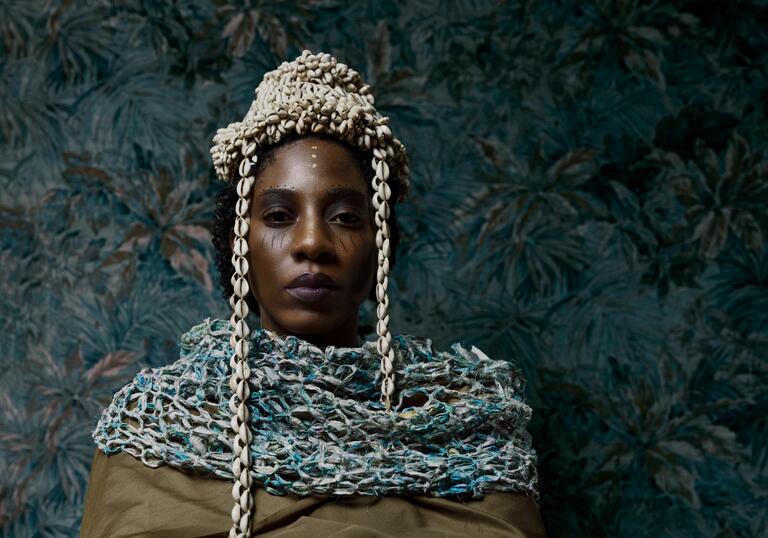
The company
Performer Julene Robinson
Creative Team
Writer, Director, Designer, Movement Director and Sound Designer Julene Robinson
Creative Support Kaleb D'Aguilar
Creative Director Chadley Larnelle
Lighting Designer Stevie Porter
Producers Julene Robinson and Pauline Walker
Stage Manager Holly Glenn
Portrait Photographer Tendai Pottinger
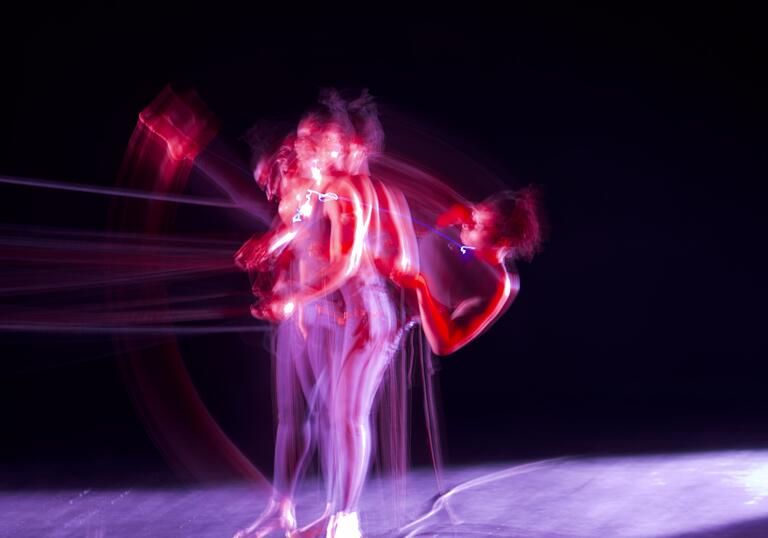
Against all odds: the story of The Night Woman
The creative process behind any show is often a rollercoaster ride of inspiration, challenges and determination. The Night Woman by Julene Robinson was no exception.
You can’t create a show like this and not expect to go through some tough times.
Buntu Yello (Movement Director 2020, Barbican Open Lab)
The journey of The Night Woman commenced in 2017, in Julene Robinson’s last semester at Rose Bruford College. Faced with the task of writing her final dissertation, she grappled with uncertainty, pangs of solitude and severe homesickness. During this vulnerable period, she began to reflect on her artistic journey, which she embarked upon with deep familial connections. Her grandmother, affectionately called Miss Ayo, had a profound impact on her love for performance, and this connection became the cornerstone of her dissertation. The roots of The Night Woman were planted in this deeply personal moment.
As a newcomer to London, Robinson faced isolation, financial constraints and the daunting challenge of studio rental costs, particularly on a limited income as an immigrant student. This led her to improvise, using the snowy streets of Stratford as her rehearsal studio. It was a period that saw her first embody a night woman, a moment captured in this video. At night, adorned in a shawl and head wrap, Robinson began to explore an idea, setting the stage for the development of The Night Woman, a project that continues to evolve and resonate with audiences.
To nurture her budding idea, Robinson turned to artist Selina Thompson for advice, who recommended checking out the ArtsAdmin newsletter. There she discovered a development lab at the Arcola, which provides a valuable space for idea exploration. Not knowing anyone in London, Robinson’s resourcefulness extended to stopping random people on the streets of Dalston to invite them into the development studio to share their ideas around darkness and race.
Following this development time, Theatre Deli offered a residency which would culminate in a 15-minute performance. This compelled Robinson to hone her vision into a performance piece. Theatre Deli’s producer at the time, Emma Blackman, eventually came on board as a producer for The Night Woman.
Determined to develop the piece and pursuing all opportunities, Robinson was selected for the Barbican Open Lab in 2020, which offered her a creative haven, with the technical team’s enthusiastic support. Here, Robinson experimented with ideas, including the incorporation of ropes that became a central staging element of the show.
‘I was going to completely remove the ropes idea from the piece as I thought that would have been too much to ask,’ she reflects.
‘Everything is possible, just ask, and we will try to make it happen,’ was the mantra in the Lab. And they did.
The team’s dedication and enthusiasm for experimentation expanded the boundaries of creative freedom, and helped to breathe life into her vision. Collaboration and experimentation became the name of the game as her ideas continued to evolve.
But the onset of the COVID-19 pandemic and the closure of theatres worldwide suddenly created new roadblocks for Robinson’s ambitions. Her Open Lab sharing could only be attended by the Barbican staff who are working onsite. That meant only six people were in the audience. The show had also been accepted onto the VAULT Festival; but the pandemic saw everything cancelled.
A glimmer of hope came when Emma Blackman secured a spot for The Night Woman at The Other Palace. At this point, Robinson was performing in the West End and was able to self-fund the performance costs, and audiences finally saw The Night Woman in full for the first time.
But after an incredibly difficult journey to this point, burnout was on the horizon. With the performances completed, Robinson packed the show away with no intention to ever go back to it.
After a hiatus, a call from the Barbican came in. Robinson made the decision to revive The Night Woman for performance in the autumn of 2023. She assembled a full team and worked towards securing Arts Council funding for various aspects of her project, aiming to create a village of artists through collaborations with venues and creative collaborators. Despite an encouraging start, the grant application was declined, leaving Robinson to deliver the heartbreaking news to her collaborators: ‘It was truly heartbreaking, truly shattering. I was so sorry to all those incredible creatives, and hope they’d still work with me in the future under different circumstances.”
Determined to overcome adversity, Robinson channelled her efforts into dramatic rewrites, meticulous direction and technical preparations for the performances at the Barbican. The results are a testament to creative freedom, perseverance and a commitment to her craft.
An interview with Julene Robinson
The production explores the energies of the spiritual practices of the Obeah women. What’s your own relationship with spirituality?
I was raised in a Revival church. In the 60s in Jamaica, there was a Great Revival, and people were able to worship freely for the first time in our history. It was a movement that allowed African spiritual traditions to merge with Catholicism and European ways of worship. So I was raised to listen to the spirits, to sing and dance and praise and worship in that way. I still hold very dear to that. I also went to a Catholic school for the first 18 years of my life, I went to Mass, and I knew all of the hymns and incantations. My interaction with religion is a big part of my life. But I am a Black woman who was raised by a Black woman who was able to heal me in various different ways. I use the word healing in the show, because there was a time when my grandmother would wash my feet in olive oil and take herbs from outside and mix them into teas for me to drink, to heal my body and my mind. She would hold me in her arms. She’d do that for all of us. And I have those lived experiences in my body. I am also a scientist, a chemist, so I need a clear understanding of things. I straddle this space between a Catholic kind of religion, an African kind of religion and also the understanding of how things work. I exist somewhere in the middle!
You’ve described the importance to this piece of your connection with your grandmother. How does it feel to hold that deeply personal story in the space by yourself, alone in front of an audience?
Sometimes, I am absolutely terrified. But then, you know, my grandmothers were so important to me that I take the responsibility of sharing this story as an honour. Bits of it are incredibly exposing: so hard, that even in rehearsal I don’t want to do them. But it gets to a point in the show where it feels it’s OK to be here. I revel in those bits. It then makes me realise how important the piece is. If I was an audience member, I would want to be able to witness something like this.
I’m very grateful to our stage manager, Holly, who said she realised she wanted to connect with a part of her own history from having seen the performance. If it is possible, with one person, to realise that they too want to be connected to their own history, then I have to do the show. Because if I was sitting in the audience, I would want that for myself. To have that desire, or to be moved to want to connect even deeper with my own self, and where I come from and what lives in me. As exposing as it might be, I want to do it for that.
What’s your favourite moment in the performance?
I enjoy playing the Night Woman, she’s very fun. There is a moment when she is just dancing and enjoying the moment. It’s like a carnival. I went to Carnival this year and truly revelled in it. It is a healing ritual for Black people. If anybody goes and truly participates in carnival, I promise you that it is a balm for the body. In the moving and the gyrating the body gets a chance to unleash and cleanse. I really love that because where we come from in the show to arrive in that moment is truly special.
How important was the Barbican Open Lab scheme in development of your practice and piece?
Barbican Open Lab really opened the show up for me. It’s hard to explain The Night Woman to people, but Open Lab allowed me to show you what it is. The Barbican producer I worked with invited me to do what I want. There are such incredible resources and tech staff who allowed me to try things out. I’d ask the lighting operator whether something was possible and he’d say ‘anything is possible, just tell me what you want!’ So we’d spend hours trying different lighting states, just to create the feeling of what I was going for.
I also wanted ropes on the walls, as a metaphor to explore our connections: not just our connection to each other, but our connection to space, to the past, to the future. It’s string theory and multiple dimensions. All of that is these symbols. The ropes are so important - but I was going to remove them! The movement director who was with me in the Open Lab, Buntu Yello, said let’s just ask! So we did. And in no time, there were ropes connected to the walls.
How would you describe your approach to theatre-making?
I feel like I need to make one or two more pieces to find that out. A lot of this show was made out of necessity - I had something to say and I really needed to say it. And once I started making, I had to find a way to get it further down the road.
But I do know I love mythology and marvel. I love positioning people in times beyond themselves. I love music to move through a piece, and sound is very important to me. I love an immersive experience. I don’t want the audience to feel like they’re on the outside looking in, but that they’re in the experience with you. The way the show opens, it centres the audience first. And then we come into the telling of the story. I like that.
Who else’s work do you admire?
I consume a lot of theatre, film and art so it's not a simple answer for me. There’s a beautiful actor in Jamaica called Nadean Rawlins, who was one of the first people I saw on stage, acting. I was inspired to do it. I have also seen so many actors and performers whose work I admire: Selina Thompson and her piece Salt, which I saw at Edinburgh Fringe in 2017; For Black Boys Who Have Considered Suicide When The Hue Gets Too Heavy at the Royal Court; Carrie Mae Weems at the Barbican; Akram Khan’s work; Marina Abramović, for the way she engages audiences. Lina Iris Viktor is an influence for The Night Woman - a series of her work follows a Black woman alone in the images, with a motif of gold and black. And Dorothée Munyaneza, a Rwandan choreographer and theatre-maker whose work is wrenching and beautiful in the way she uses her body in the work.
Are you able to say what your next project might be?
The next one is an extension of The Night Woman, and it’s called The Iron Woman. It is an exploration of the idea of something being ‘in your blood'. The way you are is in your blood. That idea of the heritage and history, identity and personality inside this fluid that runs through your body. What makes blood, blood?
The redness of blood is connected to the metal iron. Iron also exists as rust on metal, and it has the ability to conduct electricity. And then it also has the potential to be in the ground and form a beautiful rich red soil. Iron is so strong that it is able to hold your history right from your ancestors that lived hundreds of thousands of years before you: it now lives in your blood. I had this idea while I was in my chemistry class!
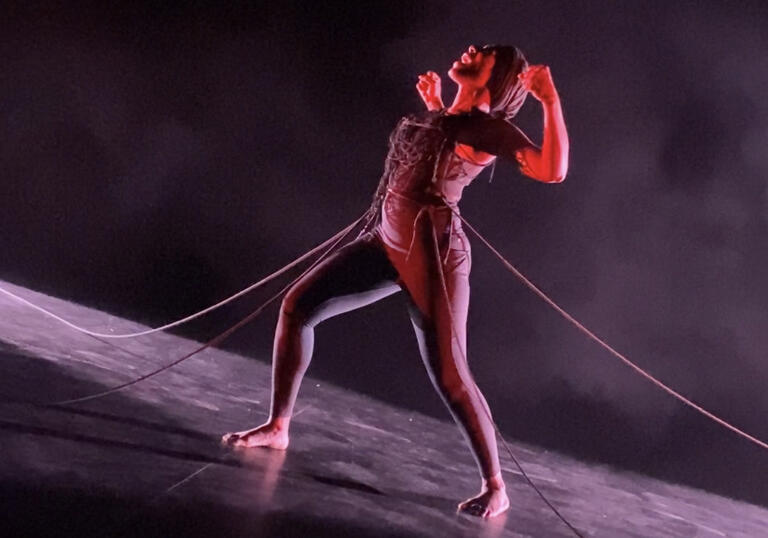
Spirituality and movement
Julene Robinson introduces the connection between two powerful forces in her work.
The Night Woman was born out of movement. Movement as a way of processing trauma is an important part of Caribbean culture. Movement is spiritual. I was raised in a village of people from very different religions – Revivalist, Seventh Day Adventist, Methodist and Protestant – and, for the first 18 years of my life, I attended a Catholic school. Spirituality and religion have significantly influenced my life and allowed me to experience the dynamic ways in which people employ their bodies in celebration and service. Returning to the origins and exploring the evolution of cultural movement practices and their role in liberation was really important.
The rhythm of the drums heard throughout The Night Woman is that of the Kumina tradition, a vibrant and deeply rooted cultural and spiritual tradition which bears a powerful testament to the enduring spirit of Afro-Caribbean communities. Typically performed in the parish of St Thomas during births, deaths and special events, Kumina originated from the Kongo people of Central Africa, who introduced it to the Caribbean through the transatlantic slave trade. Kumina’s core beliefs and practices revolve around the veneration of ancestors, spirits and nature, acting as a bridge between the African heritage of the enslaved and the realities of the Caribbean. Kumina practitioners engage in rituals to honour and communicate with these ancestral spirits, often through dance, music and song.
The realm of spirituality and the world of artistic performance have long been intertwined. Across different cultures and time periods, spirituality and performance have converged to create profoundly moving and evocative experiences. Dance, in particular, stands out as a significant form of performance closely entwined with spirituality. Movement can be a potent means of connecting with the divine and accessing the knowledge that resides within us. Movement, and more specifically these deeply spiritual movements, frame the content of this performance. I invite the protagonist to use movement that connects with her ancestors, and process the impact of the ‘isms’ prevalent in the world.
© Julene Robinson, November 2023
Costumes
Without a budget for costume design and making, Julene Robinson conceived the design for all the costumes, and hand-made costume two and three herself. She wanted the Night Woman’s costume to be a stunning piece of work, taking inspiration from the Jamaican Masquerade Jonkanoo character, Pitchy Patchy but with rope. The ropes are a symbol of many things throughout the show. The thinking around the costume evolved as the show evolved. This round she wanted to highlight femininity, sensuality and joy in the black woman's body.
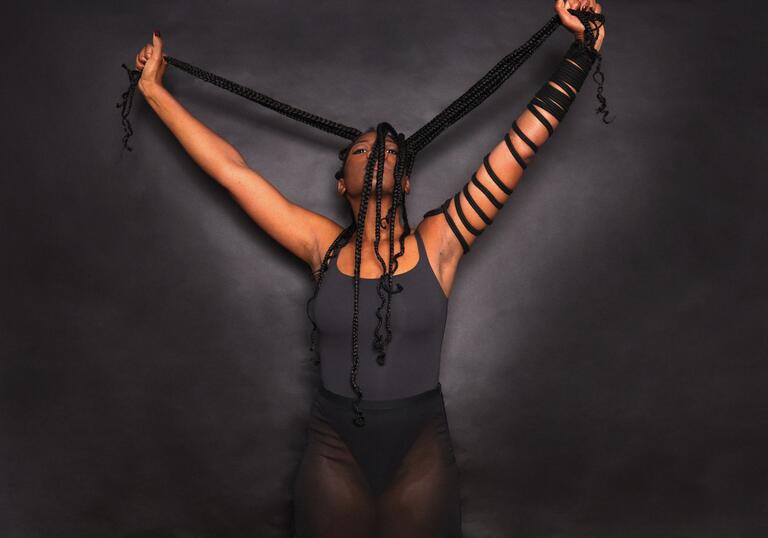
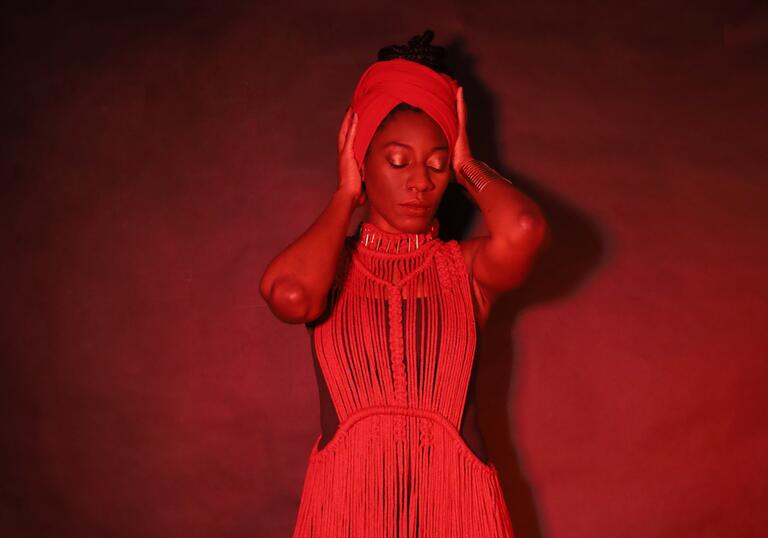
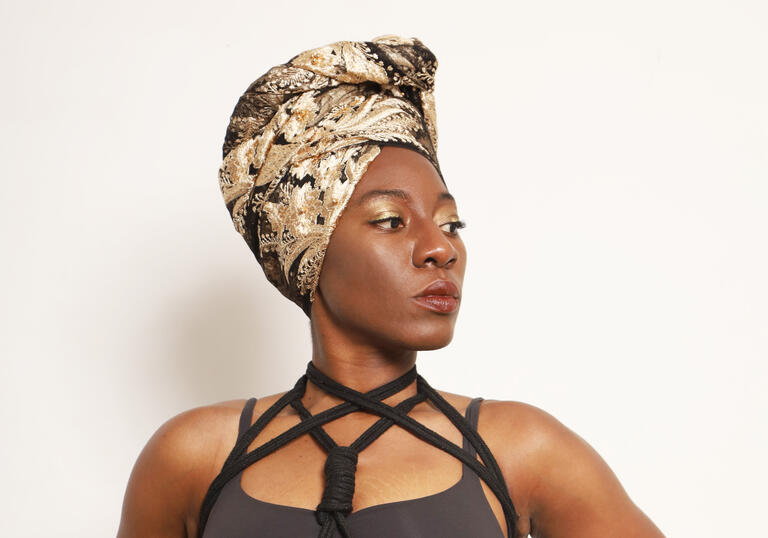
A Gift of Chocolate
At matinee performances of The Night Woman, chocolate is made available to audienes. In this article, Julene Robinson reveals the reasons behind this act of sharing.
There are countless ways to connect with an audience, but for me, as both an artist and a chemist, the link between science and sensation is one I cherish. When I envision my audience members leaving the theatre after one of my performances, I don’t just see people seeking the exit; I see individuals ready to embark on the next phase of their evening – be it gathering with friends and family, rushing home to pets or the quiet contemplation of the experience.
As an artist, I’m deeply aware of the emotional and physical journey that the audience undergoes during the performance. I walked into a theatre once and walked out never the same again. The human body is a finely tuned instrument, and I believe it’s essential to consider the complete experience, including what comes after the final curtain call. With this perspective in mind, I wanted to offer a token of care, something that would not only tantalise the taste buds but also provide a sense of well-being, especially since I am asking you to stick around with me for a post-show talk.
And that’s where chocolate enters the picture. Cocoa, derived from the cacao fruit, is a wondrous creation of nature. Cocoa has a remarkable impact on our well-being. As a chemist, I understand the intricate science behind it. When consumed, cocoa stimulates the brain to release endorphins, often referred to as ‘feel-good’ chemicals. These endorphins reduce pain and promote a sense of joy, making them a powerful mood enhancer.
But the decision to share chocolate with my audience isn’t solely based on the science of pleasure. It also harks back to my personal history and cherished memories. My grandfather had a special tradition that holds a special place in my heart. Whenever I returned home, he would prepare a warm cup of cocoa and boil an egg. We would then sit together on the veranda, sipping our cocoa, often in silence. These precious memories represent a blend of joy and comfort that I hold dear.
To add an extra layer of sweetness to this endeavour, the chocolate used in this gesture is sourced from Firetree, a company that has offered their invaluable support. And as a perfect finishing touch, our Barbican producer, Mali Siloko, has roots in the very place where these chocolates are grown – a place known for its formidable women who conquer every obstacle in their path.
My decision to share chocolate with my audience is a reflection of my belief in the power of connection, not just on the stage but in the moments that follow. It’s a simple gesture, yet it carries with it a world of emotion, history, and a touch of science. Every piece of chocolate shared is an invitation to savour the show, appreciate the experience, and find joy in the connection that binds us all. It’s more than just a treat – it’s a sweet bond that transcends the theatre.
Chocolate Love: Firetree
Firetree: the chocolate brand considering the gender dimension of cocoa production
Gender inequality affects people and places the world over, from the corridors of power in London to the cocoa farms of developing countries, where women involved in the production of cocoa normally receive a lower income than men, with many earning less than the minimum wage. According to the World Economic Forum, it will take 202 years to close the global economic gender pay gap at our current rate of progress, and two centuries is far too long to wait.
With over 85 years of experience shared between them, Firetree founders, David Zulman and Martyn O’Dare, were conscious of this disparity when they set out to make their super-premium, single-estate chocolate in 2017.
‘We recognise that we are sourcing the finest cocoa and we believe that what we pay should reflect that. In doing so, we hope to benefit the communities we work with. By empowering all farmers in this way, women also have an opportunity to have control over their income and can reinvest in their families and farms, therefore ensuring the sustainability of the cocoa-growing communities,’ says Firetree Managing Director, David Zulman.
Nowhere can this be seen more clearly than on Makira Island in the Solomon Islands, where one farm in Firetree’s collection stands out for championing women’s role in the cocoa industry. Owned and run by Lucy Kazimwane, this farm inverses the usual patriarchal hierarchies associated with cocoa production. Not only does Lucy own the land herself, but she also exclusively hires women to help produce the cocoa – enlisting the help of men only when needed for occasional heavy lifting work. Lucy is also able to support other women on smaller neighbouring farms by purchasing their cocoa for a fair price, as they lack their own cocoa fermentation facilities. Without Lucy, these women would otherwise have to go to the island’s cocoa buyers who have the power to intimidate or undercut them.
The impact of Lucy’s success is also helping to empower generations to come: with the profit she has made from her farming, she has been able to send her daughter to university in Australia and plans to send her youngest there, too.
In the case of family-run farms, Firetree aims to meet with the whole family, particularly the wives and sisters who may be working on the farms, to be able to get a feel for their involvement. Martyn says that, ‘by having this commitment to female empowerment embedded in our company’s culture, we hope to assist in eliminating gender inequality – an issue which concerns all those who form a part of the cocoa production and consumption chain.’
Image below: a photo of Lucy whose farm the chocolate came from.
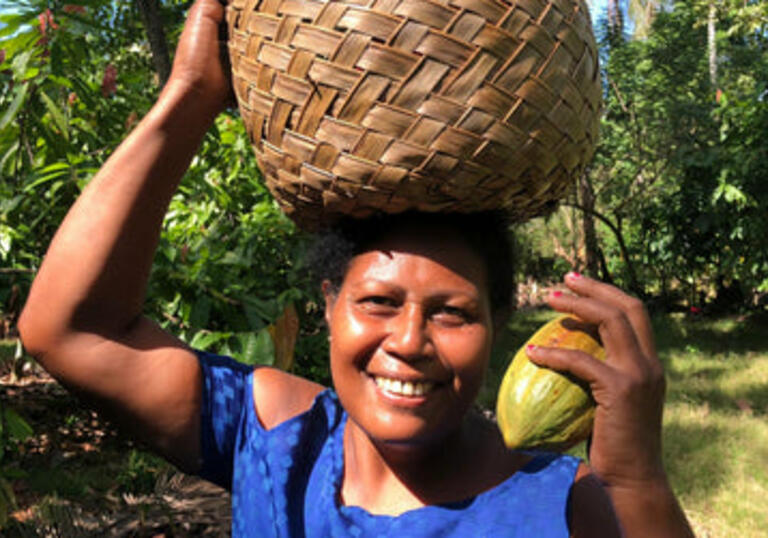
Barbican Theatre Open Lab
The Barbican Theatre Open Lab programme gives artists the opportunity to develop a new project, idea or performance as well as taking part in a year-long programme of support.
The programme has supported over 24 artists for over 4 years with practices ranging from dance, theatre, visual arts and circus. We’re dedicated to continually improving and developing the programme to support the artists that need the space and opportunity. Open Lab will be paused for the next year while we explore additional ways of supporting this important artist development programme.
Discover more
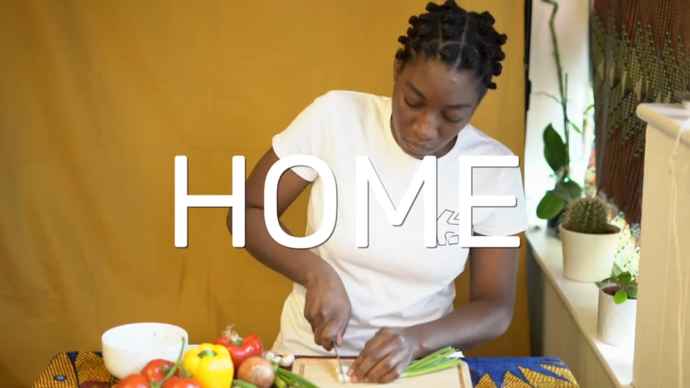
HOME: A Meditation
In this live art home installation piece created during the COVID-19 pandemic, Julene Robinson asks the question 'what is home?'.
Biographies
Julene Robinson
Performer
Julene Robinson is a Jamaican-born, London-based, international award-winning actor, multidisciplinary performance artist, writer, and scientist. She graduated from Rose Bruford College for Theatre and Performance, as well as the University of the West Indies. Julene Robinson is deemed a Global Exceptional Talent by Arts Council England, recognised for her work spanning the world, including the USA, Canada, South Africa, Portugal and Scotland. She was most recently seen playing Bob Marley’s Mother in the award-winning West End’s Get Up! Stand Up! The Bob Marley Musical and Netflix’s The Witcher. Other work in theatre includes The Ranch of the Lost Boys at the Roundhouse; and The Mountaintop and God of Carnage for University Player, among others. As a director some of her notable works are SINK UP for Virtual Collaborators; A Midsummer Nights’ Dream for University Dramatic Arts Society; and Youth Rise for the Irvine Hall Society.
Kaleb D’Aguilar
Creative Support
Kaleb D’Aguilar is an award-winning writer and director who resides between London and his homeland Jamaica. He is a Commonwealth Shorts: Caribbean Voices (2021) recipient who holds an MA in Directing from Goldsmiths, University of London, and a BSc in Anthropology from the University of the West Indies. His poetry and prose work has been published in numerous collections including PREE and the National Library of Jamaica’s New Voices, while his narrative film and video work have been showcased at the National Gallery of Jamaica as well as regional and international film festivals. His work continues to explore recurring themes of Blackness, Caribbeanness, gender, sexuality, migration, familiar bonds and the intersectional identities found between these margins.
Chadley Larnelle
Creative Director
Chadley Larnelle is a versatile and dynamic creative who thrives on integrated storytelling and innovative problem-solving. Born in Jamaica and raised in the UK, his multicultural upbringing in Birmingham shaped his unique perspective. Relocating to France and Belgium further honed his passion for human stories. He has a degree in Film and Television Studies from Brunel University and an Executive MBA from Ashridge & Hult International Business School, and has forged a career in the creative industry, continuously developing his skillset.
Holly Glenn
Stage Manager
Holly Glenn’s stage management work is mostly in new writing and children’s theatre. Recent theatre includes: Fiesta at Queen’s Theatre Hornchurch; FLOOD on tour; The Instrumentals at the Little Angel Theatre and on tour; Sleeping Beauty at The Grange Theatre; and Oppenheimer and Stage Door at Italia Conti Academy.
Tendai Pottinger
Portraits Photographer
Tendai Pottinger is a contemporary portrait photographer based in London, fascinated with capturing authentic and intimate moments. Pottinger is interested in photography that allows exploration, freedom and losing yourself in the moment, working with people who are willing to trust the process and invest in creative possibility.
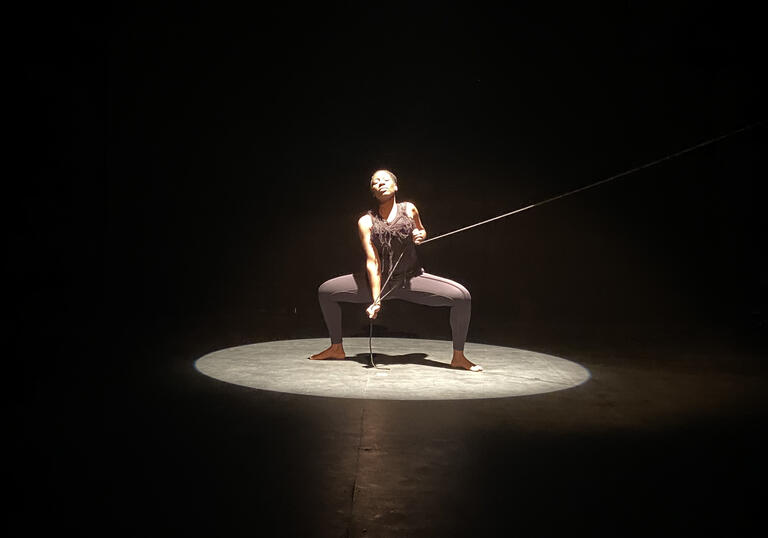
Acknowledgements
Julene Robinson would like to express heartfelt gratitude to the following individuals and organisations who have played a pivotal role in the journey and made it possible to reach this point:
Theatre Deli, Firetree, NVZN Creative Agency, Dope Black Women, Barbican Open Lab: Your support and collaboration have been instrumental in shaping my path and providing me with opportunities to grow and explore my creative pursuits. Your belief in my potential has been a constant source of inspiration.
For my grandmothers, Hyacinth Rowe and Maud Brown, the women who loved me with an unknowable depth, I cherished every moment of my life with you. Your memory continues to be a guiding light in my journey. My mother, Anna Rowe-Mulling, who loved me even before I was born and prays for me every day. You have been a source of strength and comfort and your unwavering support has been my foundation. My father, Isaac Robinson, who told me I could be anything I wanted in this world and gave me the grit to actually do it.
To Dr Khytie Brown and Dr Leanne Levers, some of the smartest women I know, who make life interesting just by being themselves. To the Ride and Fly friends Veronique Smith, Shantol Jackson, Shanique Brown, Shayne Powell, who sat with me while I cried and lifted me up when I couldn’t lift myself. You are forever an inspiration to me.
Buntu Yello, who held me when my soul was injured and danced me back into the space I love so much. I couldn’t have done this without you. Chadley Larnelle for your invaluable offering of love, time and creative vision. You unleashed an unimaginable version of The Night Woman with that image. Kaleb D’Aguilar, for all his endless support and encouragement, and for picking up all the pieces when there was no one else to pick them up.
Anna Dominian, for seeing something in The Night Woman and also in me. I am grateful to Mali Siloko for taking up the mantle and bringing us across the finish line with so much love and care.
Nicholas Henry Robinson, for everything.
Also to the countless others who have been part of my journey, I extend my heartfelt thanks. Your faith in me is everything
For the Barbican
Barbican Centre Board
Chair
Tom Sleigh
Deputy Chair
Sir William Russell
Deputy Chair
Tobi Ruth Adebekun
Board Members
Randall Anderson, Munsur Ali, Stephen Bediako OBE, Farmida Bi CBE, Tijs Broeke, Zulum Elumogo, Wendy Mead OBE, Mark Page, Alpa Raja, Jens Riegelsberger, Jane Roscoe, Irem Yerdelen, Despina Tsatsas, Michael Asante MBE
Clerk to the Board
Kate Doidge and Ben Dunleavy
Barbican Centre Trust
Chair
Farmida Bi CBE
Vice Chair
Robert Glick OBE
Trustees
Farmida Bi CBE, Tom Bloxham MBE, Stephanie Camu, Tony Chambers, Cas Donald, Robert Glick OBE, David Kapur, Ann Kenrick, Kendall Langford, Sir William Russell, Tom Sleigh, Claire Spencer AM, Sian Westerman
Directors
Chief Executive Officer
Claire Spencer
Director of Development
Natasha Harris
Director of People, Inclusion and Culture
Ali Mirza
Head of Finance & Business Administration
Sarah Wall
Senior Executive Assistant to Claire Spencer and Will Gompertz
Jo Daly
Theatre Department
Head of Theatre and Dance
Toni Racklin
Senior Production Manager
Simon Bourne
Producers
Liz Eddy, Jill Shelley, Fiona Stewart
Assistant Producers
Saxon Mudge, Mali Siloko, Bridget Thornborrow
Production Managers
Jamie Maisey, Lee Tasker
Technical Managers
Steve Daly, Jane Dickerson, Nik Kennedy, Martin Morgan, Stevie Porter
Stage Managers
Lucinda Hamlin, Charlotte Oliver
Technical Supervisors
James Breedon, John Gilroy, Jamie Massey, Matt Nelson, Adam Parrott, Lawrence Sills, Chris Wilby
PA to Head of Theatre
David Green
Production Administrator
Caroline Hall
Production Assistant
Michaela Harcegová
Technicians
Kendell Foster, Burcham Johnson, David Kennard, Bartek Kuta, Christian Lyons, Josh Massey, Fred Riding, Fede Spada
Stage Door
Julian Fox, aLbi Gravener
Creative Collaboration and Learning
Head of Creative Collaboration
Karena Johnson
Producer
Lauren Brown
Assistant Producer
Rikky Onefeli
Marketing Department
Head of Marketing
Jackie Ellis
Deputy Head of Marketing
Ben Jefferies
Senior Marketing Manager
Kyle Bradshaw
Marketing Assistant
Rebecca Moore
Communications Department
Head of Communications
James Tringham
Senior Communications Manager
Ariane Oiticica
Communications Manager
HBL
Communications Assistant
Sumayyah Sheikh
Audience Experience
Deputy Head of Audience Experience & Operations
Sheree Miller
Ticket Sales Managers
Lucy Allen, Oliver Robinson, Ben Skinner, Jane Thomas
Operations Managers
Seán Carter, Rob Norris, Elizabeth Davies-Sadd, Samantha Teatheredge, Hayley Zwolinska
Operations Manager (Health & Safety)
Mo Reideman
Audience Event & Planning Manager
Freda Pouflis
Venue Managers
Scott Davies, Tilly Devine, Tabitha Goble, Nicola Lake, Maria Pateli
Assistant Venue Managers
Rhiannon Brennan, Melissa Olcese, Daniel Young
Crew Management
Dave Magwood, Rob Magwood, James Towell
Access and Licensing Manager
Rebecca Oliver
Security Operations Manager
Naqash Sheikh
With thanks
The Barbican is London's creative catalyst for arts, curiosity and enterprise. We spark creative possibilities and transformation for artists, audiences and communities – to inspire, connect, and provoke debate.
We're committed to making a difference locally, nationally and internationally by showcasing some of the most inspiring and visionary work by artists and communities. We're not-for-profit. Each year we need to raise 65% of our income through fundraising, ticket sales, and commercial activities. Our supporters play a vital role in keeping our programme accessible to everyone, which includes our work with local schools; development opportunities for emerging creatives; and access to discounted and subsidised tickets.
Barbican supporters enjoy behind the scenes access across the centre and see first-hand what their gift enables through enhanced priority booking, as well as access to tickets for sold-out performances and exclusive events. For more information please visit www.barbican.org.uk/join-support/support-us or contact [email protected].
With thanks...
Founder and principal funder
The City of London Corporation
Major Supporters
Arts Council England
Calouste Gulbenkian Foundation (UK Branch)
Kiran Nadar Museum of Art
SHM Foundation
Sir Siegmund Warburg’s Voluntary Settlement
The Terra Foundation for American Art
Leading Supporters
Trevor Fenwick and Jane Hindley
Marcus Margulies
Programme Supporters
Marie-Laure de Clermont-Tonnerre (Spirit Now London)
Sayeh Ghanbari
Goodman Gallery
Kristin Hjellegjerde Gallery
Elizabeth and J Jeffry Louis
Pat and Pierre Maugüé
Hugh Monk
Romilly Walton Masters Award
Jack Shainman Gallery
The Rudge Shipley Charitable Trust
Director’s Circle
Anonymous (1)
James and Louise Arnell
Farmida Bi CBE
Jo and Tom Bloxham MBE
Philippe and Stephanie Camu
Cas Donald
Alex and Elena Gerko
Trevor Fenwick and Jane Hindley
Sian and Matthew Westerman
Corporate Supporters
Audible
Bank of America
Bloomberg
Bolt Burdon Kemp
Campari
Google Arts & Culture
Linklaters LLP
Norton Rose Fulbright
Osborne Clarke
Pinsent Masons
Standard Chartered
Sotheby’s
Slaughter and May
Taittinger
UBS
Vestiaire Collective
Trusts & Grantmakers
The Austin and Hope Pilkington Charitable Trust
Art Mentor Foundation Lucerne
Art Fund
Bagri Foundation
CHK Foundation
Cockayne – Grants for the Arts
Fluxus Art Projects
John S Cohen Foundation
Embassy of the Kingdom of the Netherlands
Goethe-Institut London
Helen Frankenthaler Foundation
High Commission of Canada in The United Kingdom
Italian Cultural Institute in London
Korean Cultural Centre UK
Kusuma Trust UK
London Community Foundation
Mactaggart Third Fund
Maria Björnson Memorial Fund
Peter Sowerby Foundation
The Polonsky Foundation
Rix-Thompson-Rothenberg Foundation
SAHA Association
Swiss Cultural Fund
U.S. Embassy London
We also want to thank the Barbican Patrons, members, and the many thousands who made a donation when purchasing tickets.
The Barbican Centre Trust Ltd, registered charity no. 294282
